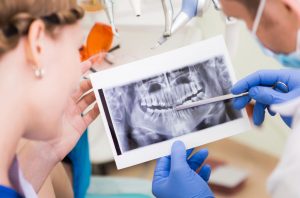
America’s CDC has listed water fluoridation as one of the ten great public health achievement of the 20th century, along with triumphs such as immunisation, motor vehicle safety, family planning and healthier mothers and babies.
So if you’ve recently discovered you’re eating for two, you may be wondering if fluoride is still the go. In short, yes, it’s still a good idea to use flouride – providing that you don’t swallow your toothpaste. But don’t let that little caveat scare you.
FACT: We’re all encouraged not to swallow fluoridated water.
The reason?
A: We only need fluoride to work on our teeth, topically, and
B: Large doses of fluoride may be harmful.
Try to avoid misinformation.
When you’re pregnant, you want the absolute best for your unborn child, so it’s natural to become frightened, overwhelmed, or, in our time of social media, misinformed. So if you’ve accidentally wandered onto the wrong websites or have found yourself the recipient of a well-meaning friend’s Facebook post, you may have read some misinformation on fluoride, like the fact that it’s a neurotoxin. Fluoride is a neurotoxin, but certainly not in the dosage that you’re exposed to. Fluoride would have to be ingested in extremely large quantities to have damaging effects.
 Young children are given special kids’ formula toothpaste that don’t contain fluoride. Sadly, this fact is often used by ill-informed individuals arguing that “if fluoride is removed from kids toothpaste, then the government must know that it is bad for you”.
Young children are given special kids’ formula toothpaste that don’t contain fluoride. Sadly, this fact is often used by ill-informed individuals arguing that “if fluoride is removed from kids toothpaste, then the government must know that it is bad for you”.
This is a poor argument. Kids’ toothpaste does not contain fluoride because experts understand that young children have poor gag reflexes and will sometimes randomly swallow things that they shouldn’t. So to eliminate this risk, experts leave fluoride out of children’s toothpaste formulations.
To make up for not having fluoride in their toothpaste, young children are given fluoride treatments in the dental chair (in a more controlled environment), and also drink fluoridated water.
Fluoride prevents cavities, which helps to save teeth. It’s safe, effective and extremely cheap.
While we’re talking about pregnancy & teeth…
It’s essential that you take good care of your teeth while pregnant – as its particularly important for your baby. In fact, there is a link between mums to be with periodontal disease and premature birth – so keep brushing (gently). With all the hormonal changes you are experiencing while pregnant though, you may notice a few changes in your body that make dental hygiene are tiny bit more challenging.
Tender gums
Your gums may become more sensitive, and may even become puffy, red or tender. Get around this problem by using a soft bristle toothbrush and flossing gently and carefully to eliminate any debris.
Morning sickness
If your suffering morning sickness, you may find that all that brushing and swilling make you nauseous. If so, switch to a smaller toothbrush so you don’t have to open your mouth as far, and if you feel particularly bad the mornings, be flexible and change your brushing routine till later in the day. If you vomit, rinse the acids from your mouth clear water.
Gastric reflux
Some women develop gastric reflux as the baby grows, as the baby puts pressure against the mum-to-be’s abdominal wall,causing digestive acids to push back up your throat. Not only is this quite unpleasant but it can be damaging to your teeth as the acid can erode the enamel. To avoid such damage, try to keep yourself elevated in bed with extra pillows, and eat smaller meals more often.
If you suffer reflux while pregnant, as with vomiting rinse your mouth regularly with water to flush away the acids – and don’t clean your teeth for at least 30 minutes. (Gastric acids can eat into the enamel and make them more vulnerable, so you don’t want to be vigourously brushing with a toothbrush at this time).
Q: Can I have dental work while pregnant?
Yes, you can have dental work performed while pregnant. If you find yourself suffering from morning sickness, you may find that the second trimester is a more ideal time for dental work. The second trimester may also be better than the third as many women find it uncomfortable lying supine in the final stages of pregnancy.
Q: What about x-rays?
 These days, the amount of radiation in a single x-ray is extremely low. To put it in perspective, it’s about the same type of exposure you’d receive in a 1 to 2-hour flight. Therefore, if you are pregnant, the consensus is it’s safe to have x-rays, but we’d still like to keep it minimal during this time.
These days, the amount of radiation in a single x-ray is extremely low. To put it in perspective, it’s about the same type of exposure you’d receive in a 1 to 2-hour flight. Therefore, if you are pregnant, the consensus is it’s safe to have x-rays, but we’d still like to keep it minimal during this time.
So why does the dentist leave the room, if it is so safe?
Don’t worry about that! Any health professional dealing with x-rays all day long will leave the room because exactly that – they are dealing with x-rays all day long.
Stay organised (where possible!)
Keep on top of your dental health while pregnant and you’ll benefit in several ways:
· avoid developing periodontal disease which may lead to premature births
· minimise the chances of leaving serious dental issues undetected
· free up time once your baby has arrived, knowing that you’re on top of your dental health.
Pregnancy facts from the ADA
If you’d like to read more about pregnancy and dental work, the Australian Dental Association have a great PDF on pregnancy and dental myths here>
References:
https://www.cdc.gov/grand-rounds/pp/2013/20131217-water-fluoridation.html; https://fluorideexposed.org/fluoridation-one-of-10-ways-we-beat-disease; https://www.ada.org.au/Your-Dental-Health/Younger-Adults-18-30/Dental-X-Rays
